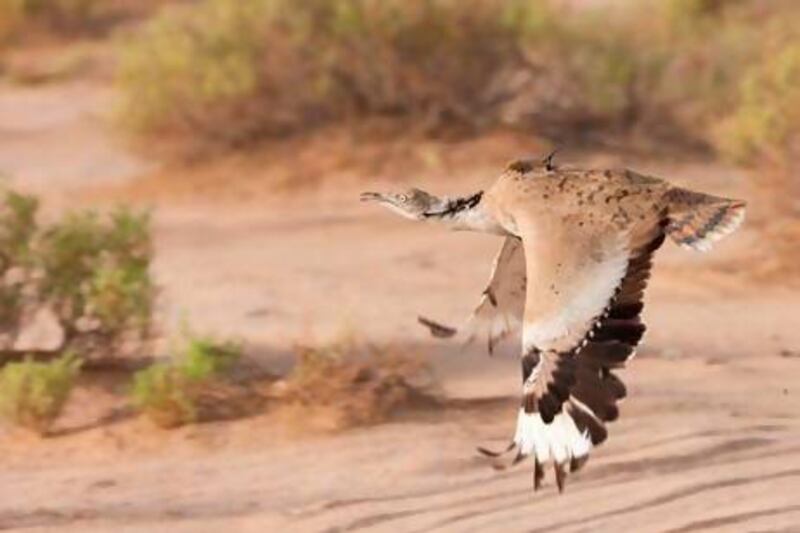DUBAI // Efforts to save a vulnerable species of bird from extinction have taken a huge step forward after about 6,000 of them were released into the wild following a UAE breeding programme.
The houbara bustard, bred in Abu Dhabi, were released in the UAE and the protected areas of Kuwait, Qatar and Yemen.
The bustards are part of an ongoing rehabilitation project by the International Fund for Houbara Conservation( IFHC), a body set up in 2006 by Sheikh Mohammed bin Zayed, Crown Prince of Abu Dhabi and Deputy Supreme Commander of the Armed Forces.
“This record release of Asian houbara into the wild follows on from a record year for our captive breeding programme,” said Mohammed Saleh Al Baidani, director general of IFHC. “It represents significant progress towards achieving our ambition of restoring sustainable wild populations of houbara across the whole range of the bird.
“By releasing houbara in other Arabian Gulf countries we aim to increase the numbers of birds residing and breeding in the region to increase numbers so wild populations achieve long-term sustainability.”
More than 4,400 Asian houbara were released in the UAE between October and March this year. That number far surpasses the previous record for local releases in one season at 1,292. Of the birds provided to the Gulf countries, Qatar received 1,000, Kuwait 250 and Yemen 200, bringing the number of releases to 5,855.
“This is a significant step forward in our efforts to secure a living legacy for the vision of the late Sheikh Zayed to ensure wild populations of the houbara are sustainable,” said Mohammed Ahmed Al Bowardi, deputy chairman of the IFHC board.
“By extending the release of houbara across the Gulf, with the assistance of our neighbours, we can build on the successes we have already achieved and bring our ultimate goal closer to fruition.
“I want to thank our brother nations in the region for their support in this important initiative. Such unity of purpose not only provides a greater chance for success in the area of conservation, but also serves to strengthen the bonds that tie us together.”
Houbara are classed as a “vulnerable” species and have seen their numbers dwindle over the years through hunting.
The bird has been traditionally favoured as prey for hunters using falcons.
The IFHC runs a breeding programme in Sweihan, Abu Dhabi, as well as in Morocco and Kazakhstan.
Thirteen thousand houbara chicks were hatched in last year’s breeding session.
The fund said the number of birds hatched this year would be announced shortly.






